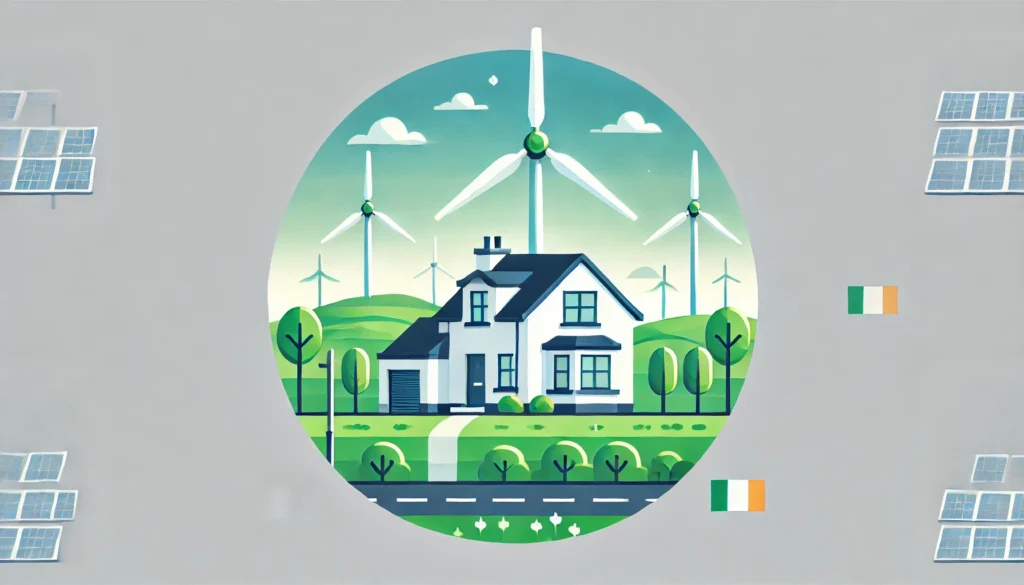
With rising energy costs and increasing environmental awareness, many homeowners in Ireland are considering renewable energy sources. Wind energy, in particular, has gained attention due to Ireland’s favorable wind conditions. This article explores whether investing in home wind energy is worth it for Irish homeowners by examining the financial, environmental, and practical aspects of wind energy installations.
Financial Considerations
Initial Investment Costs
Upfront Costs: The initial investment for a home wind turbine can be significant. Costs typically range from €5,000 to €30,000, depending on the size and type of the turbine. This includes the cost of the turbine itself, installation, and any necessary permits.
Government Grants and Incentives: The Irish government, through the Sustainable Energy Authority of Ireland (SEAI), offers grants and incentives for renewable energy installations. These can help reduce the upfront costs significantly. Programs like the Better Energy Homes Scheme provide financial assistance for energy-efficient home improvements, including wind turbines.
Example: A 5 kW turbine costing €20,000 might receive a grant of €5,000, reducing the homeowner’s out-of-pocket expense to €15,000.
Operating and Maintenance Costs
Maintenance: Wind turbines require regular maintenance to ensure optimal performance. Annual maintenance costs can range from €100 to €500, depending on the size and complexity of the system. This includes inspections, part replacements, and general upkeep.
Operating Costs: Once installed, the operating costs of a wind turbine are relatively low. The primary expenses are related to occasional maintenance and repairs.
Energy Savings and Payback Period
Electricity Savings: By generating their own electricity, homeowners can significantly reduce their monthly energy bills. A typical residential wind turbine can generate between 5,000 to 15,000 kWh per year, depending on wind conditions and turbine efficiency. With the average electricity cost in Ireland around €0.24 per kWh, savings can be substantial.
Example: If a 5 kW turbine generates 10,000 kWh annually, the homeowner could save approximately €2,400 per year on electricity bills.
Payback Period: The payback period for a wind turbine investment depends on the initial costs, available incentives, and the amount of electricity generated. On average, homeowners can expect to recoup their investment within 5 to 10 years, after which the savings contribute directly to household income.
Environmental Benefits
Reduction in Carbon Footprint
Greenhouse Gas Emissions: Wind energy is a clean, renewable source of power that produces no greenhouse gas emissions during operation. By installing a wind turbine, homeowners can significantly reduce their carbon footprint.
Example: A 5 kW wind turbine can offset approximately 2.5 tonnes of CO2 annually, equivalent to the emissions from driving a car for over 10,000 kilometers.
Sustainability
Renewable Resource: Wind is an inexhaustible resource, unlike fossil fuels which are finite and contribute to environmental degradation. Utilizing wind energy contributes to a sustainable future.
Practical Considerations
Wind Conditions in Ireland
Favorable Wind Speeds: Ireland has some of the best wind resources in Europe, particularly in coastal and rural areas. Average wind speeds are typically above the minimum required for efficient wind turbine operation, making it an ideal location for home wind energy.
Site Suitability: The effectiveness of a wind turbine depends on the specific site conditions. Open areas free from obstructions like trees and buildings are optimal. Conducting a wind resource assessment can help determine the best location for installation.
Installation and Space Requirements
Space Needs: Wind turbines require sufficient space for installation, both for the tower height and to ensure unobstructed wind flow. Rural properties and homes with large plots of land are generally more suitable for wind turbines.
Planning Permission: In Ireland, installing a wind turbine typically requires planning permission, especially for larger systems. Homeowners should check with their local planning authority to understand the requirements and obtain the necessary permits.
Noise and Aesthetics
Noise Levels: Modern wind turbines are designed to operate quietly, but some noise is inevitable. The noise level can vary depending on the turbine type and wind conditions. It’s important to consider the potential impact on household members and neighbors.
Visual Impact: Wind turbines can be visually prominent, which may not be desirable for all homeowners. Selecting a turbine that blends well with the surroundings and considering its placement can help mitigate visual impact.
Technological Advancements
Efficiency Improvements: Advances in wind turbine technology have led to more efficient and reliable systems. Modern turbines are capable of generating more electricity from lower wind speeds, increasing their viability for residential use.
Battery Storage: Integrating wind turbines with battery storage systems can enhance energy reliability and efficiency. Batteries store excess electricity generated during high wind periods for use when wind speeds are lower, ensuring a consistent power supply.
Case Studies and Examples
Successful Installations: Several Irish homeowners have successfully integrated wind turbines into their energy systems, achieving significant cost savings and environmental benefits. These case studies highlight the practicalities and advantages of home wind energy.
Example: The Murphy family in County Cork installed a 5 kW wind turbine and saw their annual electricity costs drop by 70%, recouping their investment within 6 years.
Conclusion
Investing in home wind energy in Ireland can be a worthwhile endeavor for many homeowners. The financial savings, environmental benefits, and technological advancements make it an attractive option. However, it’s essential to carefully consider site suitability, initial costs, and maintenance requirements. With proper planning and the support of government incentives, homeowners can enjoy the numerous advantages of wind energy while contributing to a sustainable future.
